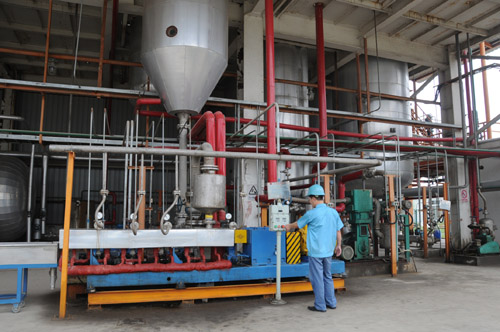Key Properties of polypropylene carbonate (PPC) Production Plant
Polypropylene carbonate (PPC) is a versatile polymer renowned for its remarkable properties and diverse applications across various industries. Delving into the realm of PPC production plants unveils a fascinating journey of innovation and sustainability.
What is polypropylene carbonate (PPC)?
Polypropylene carbonate (PPC) is a thermoplastic polymer derived from the copolymerization of carbon dioxide and propylene oxide. This unique synthesis results in a material with exceptional strength, durability, and chemical resistance.
Importance of PPC Production Plants
PPC production plant play a pivotal role in meeting the growing demand for this advanced polymer. These facilities utilize cutting-edge technologies to manufacture PPC on a commercial scale, catering to diverse industrial needs.

Key Properties of PPC
Strengths and Durability
PPC exhibits outstanding mechanical properties, including high tensile strength and impact resistance. Its inherent durability makes it suitable for a wide range of applications, from automotive components to consumer goods.
Chemical Resistance
One of the defining characteristics of PPC is its exceptional chemical resistance. It can withstand exposure to acids, bases, and solvents, making it an ideal choice for applications requiring corrosion resistance.
PPC Production Process
Raw Material Acquisition
The production process begins with the procurement of raw materials, including propylene oxide and carbon dioxide. These materials undergo stringent quality checks to ensure optimal performance in the polymerization process.
Polymerization Process
Polymerization involves the reaction of propylene oxide with carbon dioxide under controlled conditions. This process, facilitated by catalysts and specialized equipment, leads to the formation of PPC polymer chains with precise properties.
Manufacturing Techniques
PPC production plants employ various manufacturing techniques, such as melt extrusion and injection molding, to shape the polymer into desired forms. These techniques enable the creation of diverse products ranging from films to fibers.
Environmental Impact and Sustainability
Eco-friendly aspects
PPC offers several environmental benefits, including the utilization of carbon dioxide as a feedstock and the potential for carbon sequestration. Its biodegradability and recyclability further enhance its eco-friendly profile.
Recycling possibilities
The recyclability of PPC presents opportunities for closed-loop systems, where post-consumer waste is collected, processed, and reused in manufacturing. This circular approach minimizes environmental impact and conserves resources.
Applications of PPC
Industrial Uses
PPC finds extensive use in various industrial applications, including automotive parts, packaging materials, and construction components. Its versatility and performance make it a preferred choice for demanding environments.
Emerging Trends
Emerging trends in PPC applications include advancements in additive manufacturing, bio-based polymers, and sustainable packaging solutions. These innovations underscore the ongoing evolution of PPC technology.
Market Analysis
Current Market Trends
The global market for PPC is experiencing steady growth, driven by increasing demand from key industries such as automotive, electronics, and healthcare. Technological advancements and regulatory initiatives further propel market expansion.
Future Growth Prospects
Forecasts suggest continued growth in the PPC market, fueled by emerging applications and sustainable development goals. Investments in research and development are expected to drive innovation and unlock new opportunities.
Challenges and Future Developments
Technological Advancements
Future developments in PPC production may focus on enhancing process efficiency, reducing environmental footprint, and exploring novel applications. Advances in catalyst design, process optimization, and renewable feedstocks hold promise for the industry's evolution.
Overcoming Industry Challenges
Addressing challenges such as cost competitiveness, scale-up issues, and regulatory compliance remains critical for the long-term success of PPC production. Collaborative efforts among industry stakeholders and policymakers are essential to overcoming these obstacles.
Conclusion
In conclusion, polypropylene carbonate (PPC) production plants play a vital role in shaping the future of sustainable manufacturing. With their focus on innovation, efficiency, and environmental responsibility, these facilities are poised to meet the evolving needs of diverse industries. As the demand for eco-friendly materials continues to rise, PPC emerges as a versatile solution with immense potential for growth and development.
- Previous: None
- Next: None

